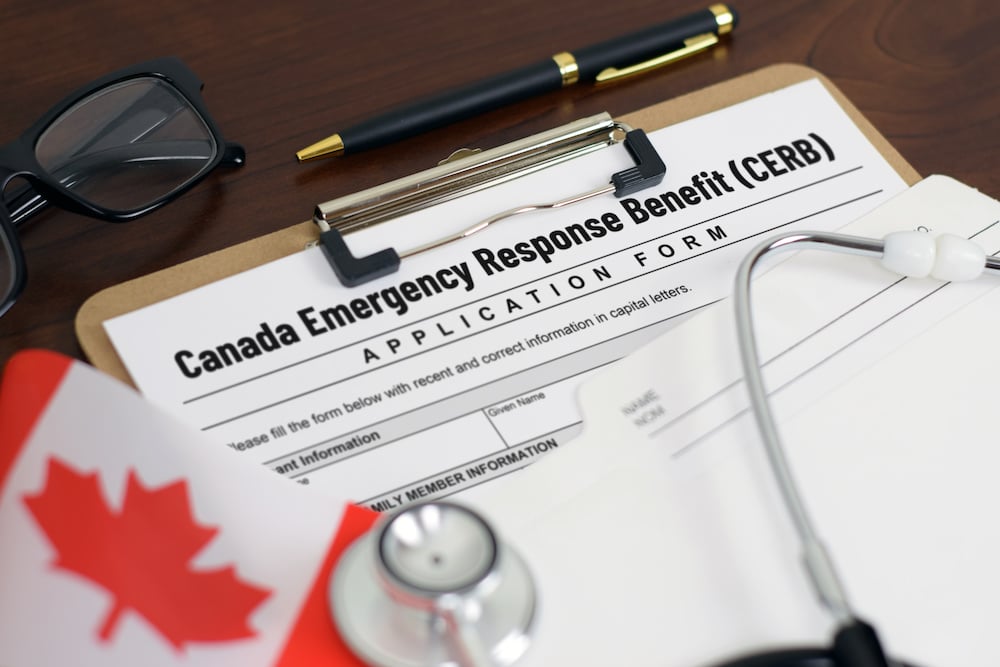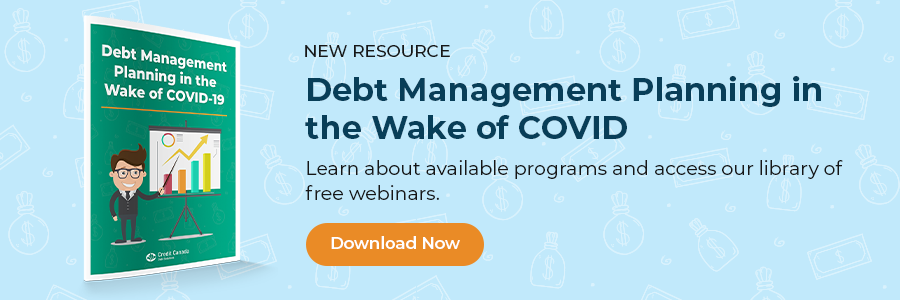
Are you worried about CERB repayment? Do you have to pay back CERB? Perhaps you received CERB funds when CERB eligibility criteria wasn't exactly clear, and now you're potentially facing a big bill from the Canada Revenue Agency (CRA). Many Canadians are worried about whether they have to deal with CERB pay back issues, CERB repayment interest, and a potential CERB penalty.
2020 has been a year like no other, with events like nothing most of us have never experienced before (and never want to go through again). The Canadian government quickly sprinted into action and created different financial support programs to help those impacted by COVID-19, including the Canada Emergency Response Benefit (CERB). CERB was a survival lifeline for many Canadians; however, it could have some potential drawbacks.
Why Did CERB Overpayment Happen?
To get funds to those who needed it as quickly as possible, the Canadian government didn’t require proof of CERB eligibility at the time of application; this would be determined at a later date. According to some sources, CERB paid out just over $81.6 billion in benefits to 8.9 million people from March 2020 until the program ended at the beginning of October 2020.
Although this helped millions of Canadians get by—financially speaking—during a time of crisis, it also created a false sense of security for many Canadians who may not have been eligible to receive CERB. In some cases, an erroneous CERB payment could become a catalyst for putting already vulnerable Canadians in a more financially precarious situation.
Paying back CERB overpayments can be a large and unexpected financial burden at a time when money is already tight for many.
Letters from the CRA Regarding CERB
Thousands of people have received letters indicating they may have received a CERB overpayment. According to the CBC, nearly 500,000 "educational" letters have been sent out asking for more information from recipients to determine if they met the income eligibility criteria for CERB.
The Canada Revenue Agency told Global News that those who have received letters shouldn’t interpret it as a determination that they were ineligible to receive CERB funds. In many cases, they are simply asking for more information to confirm their eligibility for their CERB payment.
When speaking to the CBC on December 17, 2020, Prime Minister Justin Trudeau said the CRA had already received close to a million CERB repayments from people who realized they didn’t qualify.
CERB Repayment Scams
It is very important to note that the CRA has warned Canadians to be aware of CERB repayment scams, including texts, emails, or phone calls that appear to come from the CRA asking for money or personal information.
Scam artists flourish during times of panic, crisis, chaos and misinformation. As always, you should never open attachments from unknown sources or provide your personal information to anyone, even if they claim to be from the CRA. Always verify if the source requesting this information is indeed legitimate first before following their instructions on the repayment of CERB funds.
Please note that the CRA always contacts you by letter, not through texts, emails, or phone calls. If you receive a text, email or phone call claiming to be from the CRA requesting personal information or money transfers, do not respond or open any attachments—this is likely to be a CERB repayment scam. Instead, notify the Canadian Anti-fraud Centre immediately.
Who Has to Pay Back CERB?
If you’re wondering “who needs to make a CERB pay back,” there are three (3) main reasons why someone might have to pay back CERB:
1. You were paid twice
In November 2020, the CRA warned about 213,000 Canadians who may have been paid twice through CERB that they would have to repay the overpayment. The letters were sent to people who might have applied for CERB through both Service Canada and the CRA. The letters didn’t require immediate CERB repayment but did indicate there may be a requirement to repay the amounts received in error.
2. You didn't earn enough income in 2019
Another reason why some Canadians may have received CERB funds when they in fact did not meet CERB eligibility requirements are those who didn’t earn the minimum employment or self-employment income in 2019 required to qualify for CERB. To qualify, one had to have employment or self-employment income of at least $5,000 in 2019 or in the 12 months prior to applying for CERB.
There was some confusion around certain income that technically wasn’t considered to be employment or self-employment income. This includes things like pension income, disability benefits, student loans and bursaries, social assistance payments and Employment Insurance. There was further confusion for self-employed Canadians on how to determine their net income as opposed to gross income.
The Government of Canada recently announced that:
“Self-employed individuals whose net self-employment income was less than $5,000 and who applied for the CERB will not be required to repay the CERB, as long as their gross self-employment income was at least $5,000 and they met all other eligibility criteria.”
If these Canadians already returned CERB overpayments, as many did, the CRA and Service Canada will return the repaid amounts.
3. You didn't file your 2019 taxes
Letters have also been sent to people who didn’t file 2019 tax returns and those who haven’t shown proof of income. If you didn't file your 2019 tax return and received CERB, it's best to get your 2019 taxes done as soon as possible.
This may be very important for determining whether you need to start repayment of CERB funds you received.
Common CERB Questions
When the program was introduced, many Canadians were left wondering things like:
- Is CERB a loan?
- Can you earn money while on CERB?
- Is CERB taxable?
Is CERB a Loan?
No, the CERB is not a “loan” from the government that needs to be paid back automatically. It is a benefit from the Canadian government meant to help people get through the challenges of COVID—such as the loss of their jobs due to the pandemic. There is no such thing as a “CERB loan” to the CRA.
However, it’s easy to understand the confusion when there are articles that discuss “CERB loans” online or have titles that equate the benefit to a loan.
Despite the government’s open request for ineligible Canadians to self-report and make a CERB pay back if they were ineligible, it is not a loan. However, some Canadians may have chosen to turn the benefit into a de facto “CERB loan.”
For example, as noted by The Huffington Post in their article, “Like thousands of Canadians, René Baron is wondering whether to apply for the Canada Emergency Response Benefit — quick, needed cash — even though he knows he doesn’t qualify for it.” An official cited in the article stated that “There will be ‘no fines’ for misuse” of funds. So, there’s not really an official CERB penalty for taking the money even if you don’t qualify (though you would need to pay it back later).
By taking the money when it was needed (despite knowing they didn’t qualify for the benefit), many Canadians were able to relieve significant financial burdens in the short term. However, this came with the need to make repayments on the funds they received. While there is no CERB repayment interest penalty, the CRA may take other steps to recover debts owed.
Can you earn money while on CERB?
Many Canadians wonder if they are allowed to keep earning money if they were collecting CERB payments. Canadians who were on the program could continue to earn money, but would lose eligibility if their earnings exceeded a certain amount in any 14-day period.
As noted on the Canadian government’s FAQs page about the program: “you cannot have earned more than $1,000 in employment and-or self-employment income for 14 or more consecutive days within the four-week benefit period of your claim.” So, you could earn money while collecting CERB payments, but not too much.
If your income exceeded the amount allowed, then you would have to pay back CERB.
Is CERB taxable, or is it tax free?
“Is CERB tax free?” This is a common question among Canadians who applied for the benefit. The answer is that CERB funds are taxable, but no taxes were withheld when Canadians received the funds.
Please note that taxes are being withheld on the new benefit programs replacing CERB, but only 10 percent is being withheld. That means that, depending on your other sources of income, you could still owe money on taxes for the new benefits (if you receive them).
If you received CERB payments that you were not eligible for and paid them back by December 31, 2020, there will not be tax implications for the overpayment. However, there will still be taxes on the benefits you were entitled to receive. If you return the overpayment funds after December 31st, 2020 you may need to pay taxes on the full CERB amount received in 2020. Taxes paid on the amount you repaid will be adjusted after you file your 2021 tax return.
CERB payments will have to be included in your taxable income for 2020 and a tax slip will be issued to you. What you could owe in taxes will depend on your marginal tax rate and your other sources of income.
For example, the federal basic personal amount is $13,229 for 2020. If you received the maximum CERB payment of $500 per week for 28 weeks, you would have received $14,000. If that was your only source of income for 2020, you would owe little-to-no taxes. However, if you had other sources of income during the year, you could owe money depending on your total income for 2020 and any tax credits you may claim.
Interest Relief for 2020 Tax Debt
The Government of Canada announced that it will be providing targeted interest relief to Canadians who received COVID-related income supports and had less than $75,000 in taxable income in 2020. These Canadians will have a year with zero interest on 2020 tax debt until April 30, 2022.
While this does provide some breathing room, Canadians who owe tax debt for 2020 will eventually have to pay up. Taking a "wait and see" approach or "I'll worry about it when I get there" clearly doesn't work, as the events of 2020 have taught us. Rather than waiting until April 2022 to start putting a plan in place, it's best to start putting a budget together now that can accommodate any outstanding tax debt for 2020, while taking advantage of that interest relief period to put that plan into action. If you need help, you can contact us for free debt and credit counselling.
How to Return CERB Payments
The CRA indicated that those who applied for CERB in good faith, and who are later required to pay the money back, won’t face penalties or interest. Prime Minister Trudeau told the CBC, “You don’t have to repay during Christmas. You don’t have to think about Jan. 1 as any deadline and we’re going to work over the coming weeks and months to make sure that there’s a path forward that makes sense." He also said the government will work with individuals on a case-by-case basis.
As mentioned earlier, the Government of Canada did indicate that self-employed Canadians who earned a minimum of $5,000 in gross self-employment income and met all other CERB eligibility requirements won't be forced to start paying back CERB funds received in error.
However, that still leaves Canadians who may have included ineligible income sources, were paid twice, didn't file their 2019 taxes, and/or still didn't meet the $5,000 in gross self-employment income threshold. There are also individuals who applied for CERB, received it, and then later discovered they were in fact ineligible to receive CERB funds.
Ideally, the government could look to implement a CERB debt repayment plan where a person repays any CERB overpayments, or benefits received in error, over a reasonable period of time based on their financial ability to do so. This would prevent financially vulnerable Canadians from being pushed further into a financial abyss and/or insolvency just to repay CERB funds received in error.
The repayment plan should take into account a person's income, monthly expenses, debt payments and any other financial obligations and responsibilities they might have, allowing someone to pay back CERB in a financially sound manner that doesn't put further stress or strain on their household's finances and ability to survive in the coming months.
How to Repay Debts Owed
As a non-profit credit counselling agency, Credit Canada has decades of experience helping Canadians successfully get out of debt and repay debts owed to various creditors through a debt repayment plan, known as a Debt Consolidation Program.
It's a straightforward process where the client doesn't have to take out any additional loans or resort to insolvency (i.e., consumer proposals and bankruptcy). Instead, they make a single monthly payment through the agency which then gets distributed to all of their creditors on the Program. And that monthly payment is based on their current monthly income and expenses.
The client works one-on-one with a certified Credit Counsellor who negotiates the repayment terms with their creditors on their behalf, to make sure they are able to repay their unsecured debts while still being able to buy groceries, pay rent/mortgage, insurance, and all other monthly bills. Clients also receive money management and budgeting support from their Counsellor to help make sure they can keep up with payments and stay financially afloat.
How to Deal with CERB Repayment
In the meantime, while the Government of Canada irons out a new plan for paying back CERB, here are a few tips on how to address CERB repayment:
- Get your taxes done early to allow yourself enough time to repay the amount due and/or look into repayment options. The CRA says it can come up with individual arrangements based on one’s ability to pay.
- Speak with a tax accountant or tax lawyer if you're self-employed to see if there may be possible adjustments that can be made to your 2019 tax return. It's important to get sound advice from a tax expert as you could possibly have to pay back taxes and possibly interest and penalties.
- Repay the CERB overpayment and avoid the tax implications if you are required to return CERB funds, and you have the funds available to do so.
- Work on your personal budget to see how you might be able to accommodate any repayment amounts.
Credit Canada Can Help During COVID
Many people are getting hit financially in multiple ways. Debt payment deferrals may be ending, income tax payments will soon be upon us and some people will have CERB overpayments to deal with. CERB repayment issues are just beginning, and for many, they will affect their ability to maintain other payments. Like so many issues, burying your head in the sand is not a good option. You need to deal with the situation.
The good news is you don’t have to face this alone. Credit Canada and our certified Credit Counsellors are here to help you with financial situations like having to pay back CERB. The first step your Counsellor will do with you is an assessment of your income, expenses, assets and debts to explore the different debt relief options available to you.
Give us a call at 1.800.267.2272 to arrange a free telephone or video appointment. You could also book a free Debt Assessment online. All of our counselling is free, confidential, and non-judgmental. Now is the time to be proactive!

Frequently Asked Questions
Have a question? We are here to help.
What is a Debt Consolidation Program?
A Debt Consolidation Program (DCP) is an arrangement made between your creditors and a non-profit credit counselling agency. Working with a reputable, non-profit credit counselling agency means a certified Credit Counsellor will negotiate with your creditors on your behalf to drop the interest on your unsecured debts, while also rounding up all your unsecured debts into a single, lower monthly payment. In Canada’s provinces, such as Ontario, these debt payment programs lead to faster debt relief!
Can I enter a Debt Consolidation Program with bad credit?
Yes, you can sign up for a DCP even if you have bad credit. Your credit score will not impact your ability to get debt help through a DCP. Bad credit can, however, impact your ability to get a debt consolidation loan.
Do I have to give up my credit cards in a Debt Consolidation Program?
Will Debt Consolidation hurt my credit score?
Most people entering a DCP already have a low credit score. While a DCP could lower your credit score at first, in the long run, if you keep up with the program and make your monthly payments on time as agreed, your credit score will eventually improve.
Can you get out of a Debt Consolidation Program?
Anyone who signs up for a DCP must sign an agreement; however, it's completely voluntary and any time a client wants to leave the Program they can. Once a client has left the Program, they will have to deal with their creditors and collectors directly, and if their Counsellor negotiated interest relief and lower monthly payments, in most cases, these would no longer be an option for the client.
Debt Assessment Quiz
Find out which debt relief option might be right for you.







